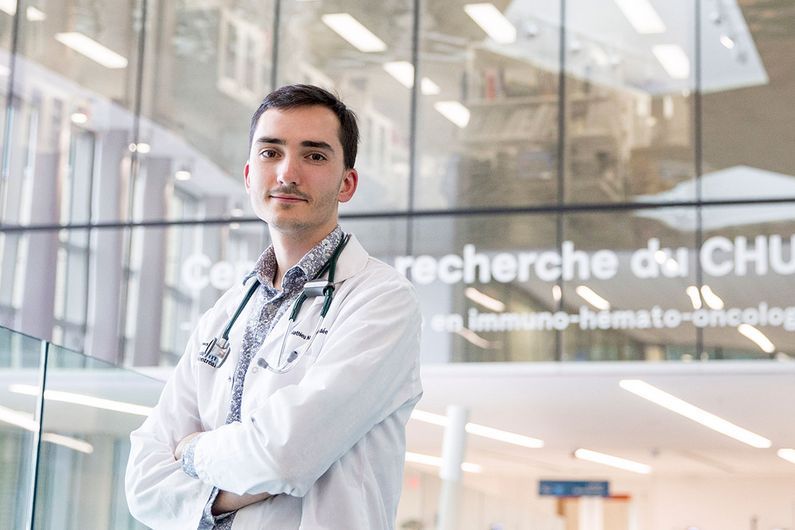Mathieu Nadeau-Vallée: Fighting disinformation among young and old on TikTok and Twitter
- UdeMNouvelles
03/04/2022
- Martin LaSalle
Mathieu Nadeau-Vallée has a high profile as an “anti-disinformer” and has become one of the most influential Quebec scientists on social networks, with young and old alike.
Mathieu Nadeau-Vallée sticks to the science on social networks and it has made him a leading Quebec influencer among both the young and the not-so-young.
His TikTok account, to which he has posted hundreds of videos, has more than 75,000 subscribers and he has 21,000 followers on Twitter.
Nadeau-Vallée holds a doctorate in pharmacology from the University of Montreal and is a resident anesthesiologist. He describes himself as “anti-disinformation” and uses the power of argument to convince even the vaccine hesitant to roll up a sleeve and get vaccinated to protect themselves against the worst effects of COVID-19.
What made you want to use social networks in your capacity as a scientist?
The fact that there were so few people defending science on social networks, especially when disinformation was being posted. I was already active on TikTok, so I could see there was a lot of disinformation targeted at young people. In the early days of the vaccination campaign, not many young people had been vaccinated. I took my cue from accounts created by scientists and doctors who were posting videos in which they responded to the viral videos pushing fake facts by describing scientific articles that contain real facts. The account I found most inspirational belongs to a retired professor of immunology, @scitimewithtracy.
What is your goal in making your voice heard on social media?
I want to put accurate information out there so that people can make an informed decision about vaccination. To paraphrase science writer and blogger Christie Wilcox, social media are platforms where people get and share information. So it’s important for scientists to be there to set the record straight when incorrect information is circulated.
Who is your primary target audience?
The people who are liable to believe disinformation, which is quite a large population and even includes experts! Disinformation has become very well organized during the pandemic and increasingly dangerous. Sometimes it is even spread by health professionals and scientists. So it’s difficult for people to know what’s what.
Are you concerned that disinformation is gaining ground?
Yes, disinformation spreads faster than authentic information because it is more accessible, often simpler and indeed simplistic, often emotionally charged, and it answers basic questions that most people have.
Not only does it spread fast but it can be very difficult to extinguish, even when it has been scientifically disproved. Andrew Wakefield is a case in point. His study linking the MMR [measles, mumps, rubella] vaccine to autism was a fraud but more than 20 years later, people still believe it, even though the link has long been discredited by multiple studies.
What is your strategy to avoid getting drawn into quarrels?
I try to stay calm and neutral, to always support my comments with the scientific literature and cite my sources, and to remain cordial. I block disrespectful or malicious users. I also use humour to lighten the mood.
When someone responds aggressively to your comments, how do you react?
I block disrespectful or aggressive people. If they make serious threats, I report it to the Sûreté du Québec.
What advice do you have for colleagues who want to comment on social media?
Surround yourself with peers who are doing the same thing as you, build a team of moderators to manage your accounts and, most importantly, take a break now and then!













